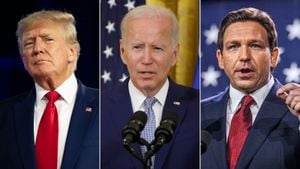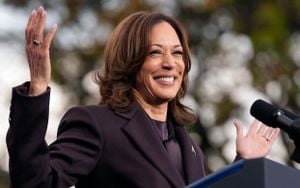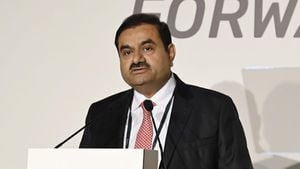The U.S. healthcare system has faced numerous challenges over the years, with the political impacts of these challenges becoming increasingly apparent. Analysts are examining how healthcare issues influenced the recent elections, particularly the 2024 presidential election, where healthcare inequality remained a trending topic.
Political experts point to the devastating toll of the COVID-19 pandemic as a reality check for the Democratic Party. Max Jordan Nguemeni, writing for Undark, reflects on his medical training during the pandemic, stating how the brunt of COVID-19 fell largely on Black and Hispanic communities. He recounts the harrowing account of a medical resident who broke down during their discussion, emphasizing the disproportionate number of Black patients filling hospital beds. This didn't just shape the experiences for medical professionals; it transformed the political narrative surrounding healthcare and equity.
Many believe the Democratic Party underestimated the importance of healthcare worries among voters, especially considering the pandemic's long-standing effects. Consequently, inadequate attention was paid to health disparities during the campaign. Polling data revealed shifting support from Black voters, particularly Black men, toward Donald Trump. The correlation between these shifts and healthcare concerns isn’t merely anecdotal—it's backed by statistics showing increased healthcare apprehensions fueling this electoral pivot.
Between 2020 and 2023, over 1.3 million Americans died prematurely, and many from marginalized racial groups, particularly Black and Hispanic communities, accounted for these losses. This drawn-out health crisis has upended notions of electoral power, as lost lives directly translate to fewer voters. According to Nguemeni’s analysis, over 50% of young, excess deaths stemmed from systemic inequities tied to health issues, leading to concerning electoral repercussions for the Democratic coalition.
The numbers paint a stark picture: around 1.7 million Black Americans who died prematurely due to structural inequality from 1970 to 2004 would now be of voting age. Their absence has directly weakened the Democratic electorate. This can be encapsulated as survivor bias; when the Black men who represented these important votes were lost to the pandemic or overdose deaths, their communities became politically underrepresented.
The opioid crisis intensified during the pandemic, particularly affecting older Black men who faced increasing overdose deaths. Health experts noted alarming trends with overdose rates surpassing those of white individuals, exacerbated by systemic failures to provide necessary support and services. The relationship between public health and voting power is one of the most significant narratives surrounding the recent elections.
With the timing of the pandemic's 'unwinding,' experts predict many would lose Medicaid coverage, disproportionately affecting low-income voters who predominantly supported Democratic policies. Reports suggested as many as 24 million voters could potentially be disenfranchised due to loss of health coverage. Historical data indicates Medicaid expansion could lead to higher voter turnout and stronger engagement with Democratic efforts.
Craig Isherwood, director of Nebraska’s Department of Health and Human Services, seemingly diverged from the national narrative as new programs aimed at mental health emerged. Recently, Nebraska enrolled seven additional behavioral health providers as part of its Certified Community Behavioral Health Clinics initiative. This approach is expected to offer integrated care for mental health and substance use, aiming to fill substantial service gaps across the state.
State Sen. Anna Wishart (D-Lincoln), integral to the initiative’s development, noted it promotes comprehensive access to treatment—reflecting insights from other successful programs across the nation. This model has been celebrated as “transformational,” driving services to those most vulnerable regardless of income, underscoring Nebraska's push toward addressing unmet health needs.
Research indicates these clinics could diminish hospital emergencies and lower reliance on law enforcement through accessible mental health care, effectively treating crises before they escalate. Results from other states where similar clinics have been implemented show potential drops in emergency room visits and increased access to necessary care. By alleviating the intersections of physical health and mental health, officials hope this initiative will pave the path toward sustainable health improvements.
Across the pond, Lord Darzi's analysis of the NHS has led to calls for significant reforms. He emphasizes urgent action to tackle social care shortages to relieve pressure on hospitals. The health service is bracing for incredibly long waiting lists, exacerbated by the difficulty of discharging patients due to lack of care beds. Immobilized operating rooms and delayed treatments are directly correlated with social care inadequacies, highlighting the intertwined nature of systemic health care issues worldwide.
“We must address this issue; otherwise, we will keep the strain on the NHS,” Lord Darzi stated. His advocacy spotlights the nuances of healthcare delivery and the political ramifications of neglecting foundational support structures within public health. The NHS recently saw nearly 7.6 million residents waiting for treatment, signaling the urgency needed for reform.
Both sets of statistics demonstrate not just the immediate health effects but also the long-term political consequences of neglecting healthcare infrastructures. From preventable deaths impacting voter turnout to inadequate responses to health crises shaping public policy, the narrative is joined by universal health access for all demographics. The intertwining of health services and electoral consequences paints a complex picture of governance, power, and accountability.



